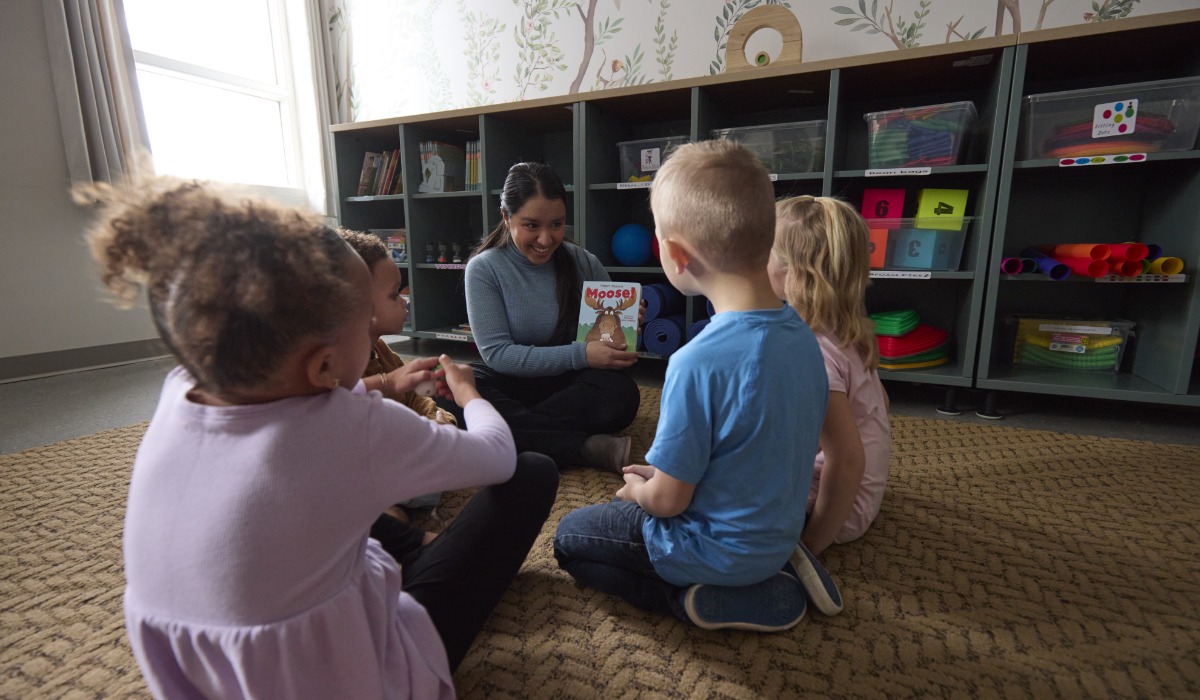Overview
Designed for those passionate about shaping young minds, our comprehensive Early Childhood Education certificate program equips you with the necessary skills, knowledge, and practical experience to work in various early childhood education settings.
You will gain a thorough understanding of early childhood education, focusing on care for children from newborn to age 12, ensuring a well-rounded perspective on child development.
You will benefit from a unique mix of classroom instruction and hands-on experience. In community settings, engage directly with children, families, and other professionals in early childhood education (ECE).
In this program, you will:
- learn to establish and maintain safe, respectful, and inclusive play environments by nurturing young children, supporting their families and engaging with communities to foster ongoing learning and growth
- cultivate a foundational understanding of child development, including effective strategies, best practices, and the design of responsive, relationship-based learning environments
- become proficient in essential skills like communication, observation, documentation, digital literacy, behaviour management, problem-solving, and collaboration, all crucial for supporting the holistic development and well-being of children under your care
- gain frameworks and perspectives, including Flight (Alberta's early learning and care framework) and broaden your perspective on key concepts such as wellness, development, equity, diversity, inclusion, reconciliation, ethics, and child-centred learning within the ECE environment.
As a graduate, you'll be a well-equipped Early Childhood Education professional, ready to take on challenging roles and make a positive difference in the lives of children and their families. Your comprehensive training will position you at the forefront of early childhood education, ready to contribute to the field with innovative ideas and practices.
This program is ideal for those looking to start or advance their careers in early childhood education, who are passionate about child development, and who seek to make a meaningful impact in the early years of a child's life.
Embark on this rewarding journey and shape the future by nurturing the minds and hearts of the youngest learners.
Early childhood educators are social, methodical and directive.
You need:
- to be playful, sensitive, and caring toward children
- initiative and enthusiasm
- resilience, persistence, and the ability to regulate your emotions
- critical-thinking skills
- to model respectful behaviour and language
- a healthy lifestyle and physical fitness
- to prioritize ethical decision-making and practice
- consistent, positive strategies to guide children's behaviour
- to plan for, observe, engage with, and support children's play and learning
- to communicate and work respectfully with children, parents, caregivers and other professionals
- to document interactions with children, parents, caregivers and other professionals clearly
- to take time to learn about each child and create a curriculum based on that learning.
You should enjoy taking a creative and open-minded approach to your work and building relationships with people, especially children. You should be at ease taking responsibility and supervising others.
You are strongly encouraged to refer to the ALIS website for career, learning, and employment information for early childhood educators to ensure you can successfully meet the occupational requirements for the program and profession.
Graduates of this program meet the admission requirements to enter SAIT's Early Childhood Education diploma program.
In this program, you'll participate in two practicum work placements that will combine professional observation, practical experience and integrated theory classes.
You will be assigned practicum placements with consideration given to your preference of location. However, due to limited availability in Calgary, it might be necessary for you to travel or relocate outside the city.
The healthcare field has a strong focus on health, wellness, and fitness to practice due to the demanding nature of the work and Occupational Health and Safety requirements. As such, special considerations will not be granted based on individual circumstances or preferences, except those stated as protected grounds when an accommodation has been approved.
In compliance with the practica agreements with our clinical partners, you will be required to provide specific documentation before you can participate in your practicum. Find out what requirements you need for this program.
Graduates are eligible to apply for the Level 2 Early Childhood Educator certification from the Government of Alberta, which is required by the Early Learning and Child Care Act to work as a frontline caregiver in the province.
Upon successful completion of this program, you'll recieve a SAIT Early Childhood Education certificate.
Careers and opportunities
Our graduates may work in the following occupations. Some careers require additional experience and education.
Associated National Occupational Classification (NOC) codes: 42202, 41405, 41404.
Career planning support
Unsure which career path is for you? Here are some recommended career planning resources to help you decide your future.
You can also head to Alberta alis for lots of information about careers in Alberta, including quizzes and labour market information to help you narrow down a path.
Finally, you can take our online career finder quiz, which can help narrow your options based on your current skills and interests.
Courses
The Early Childhood Education certificate requires 30 credits (11 courses) to complete.
The program spans one year, with two semesters.
| Course | Credits |
|---|---|
|
This course allows students to develop and practice their verbal, non-verbal, and written communication skills, which are essential for maintaining positive interpersonal relationships in an early learning environment. A broad range of communication topics and strategies will be introduced, including professionalism, diversity and inclusion, critical thinking, teamwork, and collaboration. Students will also explore conflict resolution, difficult conversations, and professional writing. |
1.5 |
|
This course focuses on the professional use of technology and interactive media to enhance daily operations in an early learning environment. Students will explore the use of the internet, digital tools, and interactive media available to early childhood educators. Discussion will include web-based applications and software, as well as digital technology to aid and enhance communication with families and the community. |
1.5 |
|
This introductory course examines the fundamentals of early childhood education. Students will explore the importance of healthy and safe environments for children and their families while considering pertinent legislation, regulations, standards and best practices. Students will develop a personal philosophy of early childhood education based on their understanding and evaluation of the course topics. Course theory will be reinforced using Flight: Alberta's Early Learning and Care Framework. |
3 |
|
This course uses a whole-child approach to introduce students to the overall development of children. This approach addresses a child's cognitive, social, emotional, and physical growth, with a focus on pre-natal development and an introduction to atypical development. To understand multiple perspectives, the material is viewed through diverse lenses. Students will explore key theories and principles of child development. Throughout the course, students will learn to create a healthy, safe, and engaging learning environment that supports the development of essential life skills and growth toward the child's full potential. |
3 |
|
In this practical extension of previous courses, students will explore the role and importance of play to children's developmental stages. Students will be encouraged to consider Flight's holistic play-based goals when given the opportunity to apply their learning of child development, childhood wellness, equity, diversity and inclusion. Beyond those concepts, students should apply language and digital literacy when planning and designing safe and age-appropriate play environments and activities for children. Both indoor and outdoor play experiences will be explored. Pre-requisites:
|
3 |
|
This course builds upon previous learning, as students continue to explore the stages of children's individual progression in the context of behaviour and social-emotional development. Students will deepen their understanding of the factors that influence children's social and emotional development as well as the related strategies, practices, and interventions needed to guide, support, and nurture age-appropriate behaviour and growth. Discussion will include strategies to help children build self-esteem and create respectful relationships in the learning environment, at home, and in their community. Pre-requisites:
|
3 |
|
This course introduces essential objectives for advancing theory and practice in early childhood education. Students will explore key strategies used to develop children's literacy and numeracy skills, and design age-appropriate activities to support these skills. Furthermore, students will explain relationships within each skillset and reflect on the interplay between culture and language development. Throughout the course, students will discuss and implement resources available for educators and use evidence-based strategies to support early childhood development. Pre-requisites:
|
3 |
|
This course introduces students to a foundation of Indigenous teachings, practices, experiences and worldviews, preparing them to professionally engage and respectfully interact with indigenous peoples and communities. Students will examine the ongoing impacts of past and present policy, as well as identify practical ways forward that align with the Truth and Reconciliation Commission of Canada (TRC): Calls to Action. Students will develop their cultural competence towards recognizing and supporting Indigenous perspectives within an early childhood education environment. Students will explore topics such as: importance of identity, language, ceremony, and land in Indigenous cultures and how this can guide communication, planning and best practices when working with children, families, communities, and elders. |
3 |
|
Using Flight: Alberta's Early Learning and Care Framework, this practicum placement allows students to develop critical thinking and decision-making skills by observing the role of the early childcare educator. The practicum will also be used to safely build fundamental skills for working with children. Integrating course concepts, students will interact with children in their placement, gaining skills in professional observation and practical experience. As the practicum progresses, students will move from observing to active engagement with children. |
3 |
|
In this practicum course, students will be given more hands-on experience within an early childhood education learning environment under the supervision of a work experience mentor. Students will be expected to apply the skills, knowledge and strategies gained from course prerequisites as they plan, observe and reflect on their day-to-day participation in their practicum. Students will play a lead role within the learning environment and be directly involved in the practice of documentation. Application of collaboration, communication skills and teamwork will be observed as students have more direct engagement with children, their families and the community. Pre-requisites:
|
3 |
|
This course focuses on the importance of creating and nurturing a learning environment that supports the holistic well-being of children, families, and child care professionals. Students will examine essential principles, skills, and strategies relating to age-appropriate nutrition and fitness concepts. The significance of health and wellness dimensions will also be discussed. Topics will include the psychological and physical health and safety of both the child and the early childhood educator. Child protection responsibilities will be explained in detail. Students will also consider how community partners can be engaged to support and promote wellness as a lifestyle to children and their families. |
3 |
Progression
You must attain a PGPA and/or a CGPA of 2.0 or better each semester and pass the prerequisite courses to progress through the program.
To qualify for graduation, you must pass all courses, attain a CGPA of 2.0 or better and complete course requirements within the prescribed timelines.
Review our grading and progression procedure >
Explore your options!
Some courses in this program are available through Open Studies. You can complete courses via Open Studies to get a head start on your education, reduce your course load once accepted into a credentialed program, or determine which career path best suits you before you fully commit.
You may also take courses for general interest or personal and professional development.
Admission requirements
Applicants educated in Canada
All applicants must demonstrate English language proficiency and meet the following requirements or equivalents:
- at least 65% in English Language Arts 30-1 or 30-2.
SAIT accepts high school course equivalents for admission for applicants educated outside Alberta.
All applicants who were educated outside of Canada must demonstrate English language proficiency and provide proof they meet the program admission requirements outlined above with an international document assessment. Find accepted educational documents and assessment options.
SAIT may also accept courses completed at certain international post-secondary institutions.
Academic Upgrading
Missing an admission requirement for this program? Upgrade your prior education to help you receive admission into one of SAIT's career programs.
English language proficiency
All applicants must demonstrate English language proficiency prior to admission, including students educated in Canada.
Transfer agreements
At SAIT, we have created transfer agreements with partner institutions to allow you to earn course credits toward your SAIT program based on your previously completed credentials.
Transfer Alberta search tool
Use the Transfer Alberta search tool to see all transfer agreements between Alberta post-secondary institutions (including those with the University of Calgary, Mount Royal University and Bow Valley College.)
Search transfer agreements in Alberta
Transfer options for graduates
When you have completed this program, you may continue your education at a partner post-secondary institution. These transfer agreements include partnerships within and/or outside of Canada.
Available intakes
Fall 2026
Start dates:
- Domestic students: Open
-
-
Application deadline: June 30, 2026
-
- International students: Open
-
-
Application deadline: May 29, 2026
-
Costs
2025/26 tuition and fees
The following estimated costs are effective as of July 1, 2025.
The estimated total cost of tuition and fees is based on the suggested schedule of study. Following a modified schedule will impact the fees you pay per semester and may alter final costs.
Domestic students
The program total is based on the estimated amount you will pay if you enter this program during the 2025/26 academic year. The program total amount listed on your letter of admission may appear higher. This amount is your maximum tuition guarantee for the program. SAIT will not exceed this maximum, regardless of changes in tuition and fees between academic years.
Books and supplies are approximately $1,000 - $1,500 per full-time year.
This is a bring-your-own-device program with a standard computer hardware and software requirement. See the specific requirements on our computers and laptops page. Your device must be portable. An Apple or Android laptop or tablet is preferred over other devices. Phones are not suitable.
Find your booklist on the SAIT Bookstore's website. Booklists are created by semester and available approximately two weeks before classes begin.
Additional fees
- A fee is associated with obtaining a police information check, including a vulnerable sector check, payable to the police or the Royal Canadian Mounted Police (RCMP).
- A fee of approximately $50 to $100 is associated with an electronic student permit checking submission required for clinical practicum placements, payable to Synergy Gateway through the Verified software platform.
- Basic Life Support (BLS) Provider (Level C) CPR annual updates are required. All CPR courses must be from the Heart and Stroke Foundation.
- You are responsible for additional expenses related to your practicum, including pre-practicum requirements and relocation costs to practicum sites outside of Calgary.
Financial aid
Paying for your education may feel overwhelming, but we have resources and programs that can help, including information about payment options, student loans, grants and scholarships.
Application process
Ready to apply?
Follow our step-by-step guide to submitting a successful application.
Communication during admission
Email is the primary source of communication during the admission process. Ensure your personal email account is managed appropriately to receive our emails, files and communications.
We recommend you add hps.info@sait.ca domain to your safe senders' list or you risk missing critical email messages.
Begin your application
Apply now using the online application portal.
Ensure you have a valid Visa or Mastercard to pay the non-refundable application fee of $120 for domestic applicants or $175 for international applicants.
Information sessions
Prepare for a strong start in your chosen program or get the details you need to decide your future path.
Our expert staff and faculty are ready to answer your questions and provide information about the following:
- What sets SAIT apart
- An introduction to the program and area of study
- Admission requirements
- Future career paths
- Information on the earning potential and graduate employment rates.
Contact us
School of Health and Public Safety Advising
-
Email - hps.info@sait.ca
International Student Advising
-
Phone - 403.284.8852
-
Email - international@sait.ca
Subscribe for updates
Your journey starts here! Sign up to get important updates on:
- Health and medical programs
- Application information
- Relevant news and events

Oki, Âba wathtech, Danit'ada, Tawnshi, Hello.
SAIT is located on the traditional territories of the Niitsitapi (Blackfoot) and the people of Treaty 7 which includes the Siksika, the Piikani, the Kainai, the Tsuut’ina and the Îyârhe Nakoda of Bearspaw, Chiniki and Goodstoney.
We are situated in an area the Blackfoot tribes traditionally called Moh’kinsstis, where the Bow River meets the Elbow River. We now call it the city of Calgary, which is also home to the Métis Nation of Alberta.




